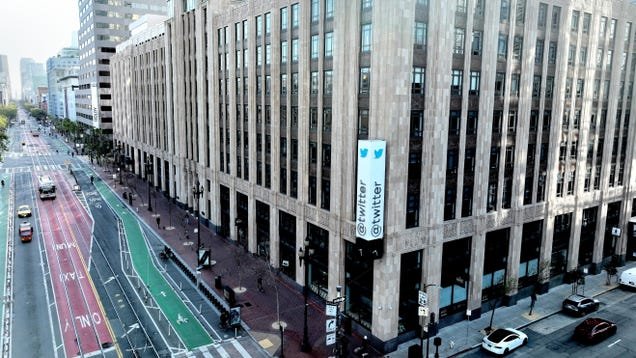Twitter has put up for auction hundreds of “surplus” goods from its corporate headquarters.
The bidding for the more than 631 items, which include heavy-duty kitchen equipment, electronics, furniture, and more, starts on Jan. 17 at 7pm.
Auctioneer Heritage Global Partners (HGP) has put the starting bids for most items, some of which originally retailed for thousands of dollars, at either $25 or $50.
What’s on sale at the Twitter auction?
Several items could come in handy for startups looking to add a buzz to their headquarters—or even just restaurants.
G/O Media may get a commission
Up to $100 credit
Samsung Reserve
Reserve the next gen Samsung device
All you need to do is sign up with your email and boom: credit for your preorder on a new Samsung device.
Consider the huge industrial refrigerators, pricey kegerator which dispense beer, rotisserie ovens that can roast 24 whole chickens at a time, pizza ovensand the vegetable dryers with a huge 20 gallon capacity. And let’s not forget the $10,000 industry-grade coffee machines—a steal.
Some other items listed at throwaway prices are less appealing, for instance an old iMac or previous generations of $4,000 bicycle-powered USB chargers. These may look like a bargain but may not last or be easy to repair. Especially since the items on sale come with no warranty.
Another batch of items, including logo statuettes and neon Twitter bird light electric display are more Twitter-specific and may pique the interest of dedicated fans. A huge “@”-shaped planter is a striking but more generic memento that could fit in well at almost any tech office.
Is Twitter selling office items to make money?
Twitter’s financial position isn’t the most sound. The company is facing a lawsuit over more than $136,000 unpaid rent at the California Street office in San Francisco. To finance the company’s $44 billion purchase, Musk sold millions of Tesla shares and lost his status as the world’s richest man.
In the quest to save and make money for the platform, Musk displayed an erratic leadership style, including abrupt layoffs and strategy pivots on verifications and subscriptions, which led some advertisers to leave the platform, further hurting its bottom line. Musk has claimed he’d be willing to give up the CEO chair, should he find someone “foolish enough” to take the job.
But the auction “has nothing to do with [the company’s] financial position,” auctioneer HGP told Fortune last month. It’s likely just a way to clear out some heavy-duty items now that less than half the workforce remains at the company. Anyway, selling couches and coffee machines would hardly make a dent in Twitter’s finances.
Quotable: Twitter’s auction is more spring-cleaning than fundraising
“They’ve [Twitter] sold for $44 billion, and we’re selling a couple of chairs and desks and computers. So if anyone genuinely thinks that the revenue from selling a couple computers and chairs will pay for the mountain there, then they’re a moron.” —A spokesperson for Twitter’s auction partner HGP in an interview with Fortune.
Who can bid at the Twitter auction?
Not everyone can participate in the bidding. Only a registered buyer who “acts for a business and not for consumer transactions” is eligible to bid in the Twitter auction.
The auction will conclude at 10am on Jan. 18, and buyers will then have 48 hours to make the payment. On top of the amount they bid, buyers have to pay an 8.63% “VAT on hammer” (the selling price announced) as well as an 18% “buyer’s premium.”
Critical note: Pick up from Market Street, San Francisco
Bidders will need to arrange a pick up from Twitter’s headquarters—1355 Market Street, San Francisco. While HGP will help get most items to the loading area, buyers have to arrange their own shipping. And for bigger items, people will “need to hire Juniors Source Corporation. Juniors is the only company allowed inside the Twitter facility.”
The removals must be completed between Jan. 23 and Feb. 3. On weekdays, collections can be scheduled between 9am and 4pm and on Saturday, between 9am to 2pm. On Sundays, the lot will be closed.
Failure to pay for the item will result in default. HGP can then re-market and resell the item. And the bidder who backed out will have to pay damages—20% of the invoice price of the item(s) or the full amount of the difference between the original invoice price and the re-sold price plus any expenses incurred to re-market or re-sell these items. Those who pay but don’t collect the items by the final removal date will have to cover the expenses incurred to store or transport items until they are re-sold.








